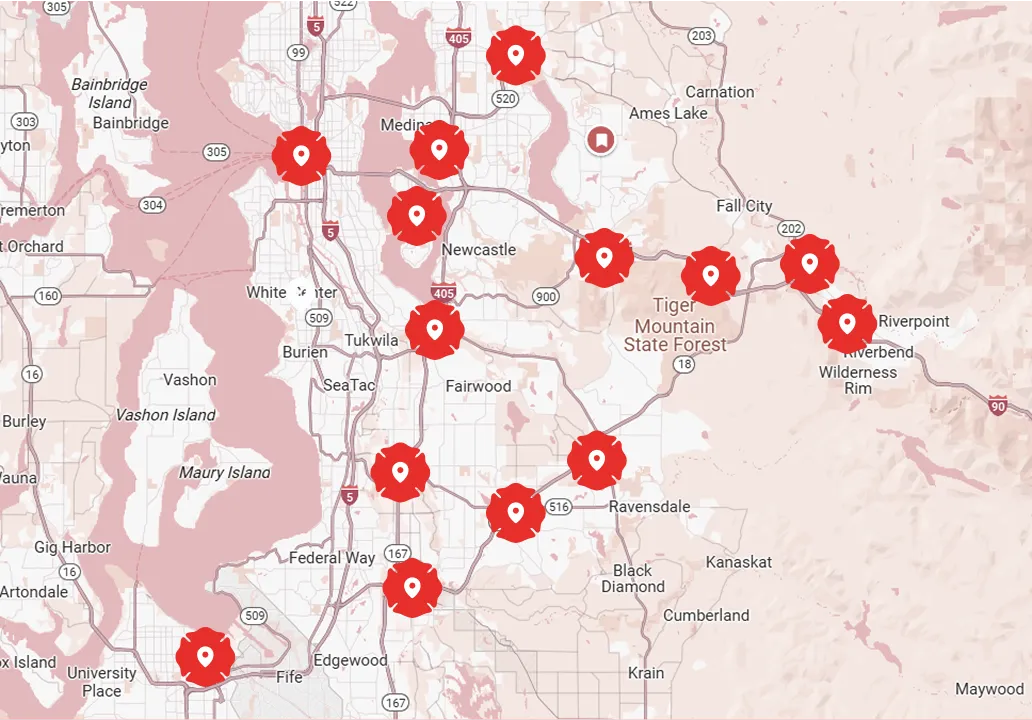Out of State Moving Companies in Bellevue, WA
.webp)
Interstate relocation from Bellevue, WA involves a detailed, regulated process that benefits from professional coordination and proper preparation. Licensed interstate movers operate under federal FMCSA guidelines to ensure compliance, safety, and transparency throughout the move. Common challenges—such as limited building access, unpredictable weather, peak-season demand, and potential communication or inventory discrepancies—are addressed through structured planning and proactive communication. The process includes pre-move surveys, accurate inventory creation, binding or not-to-exceed estimates, professional packing, and real-time transit updates. Upon delivery, movers perform final inventory checks and assist with claims or valuation processes. With careful scheduling and attention to Bellevue-specific logistics, homeowners can minimize risk, protect their belongings, and achieve a smooth, stress-free relocation experience.

Out of State Moving Companies in Bellevue, WA
Moving out of state is one of the most complex household projects you can undertake. For Bellevue, WA residents, an interstate move adds extra steps: federal compliance, long-distance logistics, secure packing for varied climates, and coordination with city and condominium rules. Choosing an experienced out-of-state moving company that understands Bellevue neighborhoods, traffic corridors, and regional weather reduces stress and protects your belongings. This page explains what to expect from reputable interstate movers, common challenges Bellevue households face, and practical steps to ensure a smooth state-to-state relocation.
Common out-of-state moving issues in Bellevue, WA
- Parking and access restrictions: Many Bellevue addresses are high-rise condos or homes on narrow streets. Loading zone permits, elevator reservations, or temporary no-parking signs are often required and can delay pickup if not arranged in advance.
- Weather exposure: Bellevue’s rainy season increases the risk of water damage during loading/unloading. Proper weatherproof packing and tarping are essential.
- Scheduling around peak demand: Spring and summer are busy for long-distance moves. Late notice can result in limited truck availability and longer delivery windows.
- Complex inventory and valuation disputes: Long hauls increase the chance of disputes over damaged or missing items, especially without a detailed inventory and clear valuation selection.
- Transit timing and communication: Interstate transit times vary by route and carrier. Inadequate communication can leave customers uncertain about delivery dates for weeks.
What licensed interstate movers provide
- Federal registration and compliance: Reputable interstate movers are registered with the Federal Motor Carrier Safety Administration (FMCSA) and have USDOT/MC numbers. This ensures they follow federal rules for billing, liability, vehicle safety, and consumer protections.
- Written estimates and Bill of Lading: An interstate move should include a written estimate and a Bill of Lading (the legal contract). The BOL outlines services, delivery windows, inventory, and your selected valuation coverage.
- Valuation options: Movers offer valuation (insurance) choices, typically Full Value Protection or Released Value. Full Value Protection provides higher reimbursement for loss or damage; Released Value is minimal and tied to shipment weight. Understand the difference before signing.
- End-to-end coordination: From initial survey and packing through pickup, transit tracking, delivery, and unpacking, experienced interstate companies coordinate carriers, routes, and schedules to avoid surprises.
- Specialty handling and storage: Options commonly include white-glove packing for fragile items, vehicle transport, short- or long-term storage in climate-controlled facilities, and handling of specialty items like pianos or antiques.
Our process for a smooth state-to-state relocation
- In-home or virtual survey: A qualified estimator documents items, access constraints, and additional services needed. Accurate surveys reduce the risk of added charges at pickup.
- Written estimate and plan: You receive a clear estimate (binding, non-binding, or binding not-to-exceed) and a move plan that includes pickup date, expected transit time, and logistical notes for access.
- Packing and protection: Professional teams use industry-grade materials to protect furniture, electronics, and textiles. For Bellevue moves, extra waterproofing and elevator-friendly packing methods are applied.
- Pickup and inventory check: Movers create a detailed inventory and you sign the Bill of Lading. Photos can be taken for high-value items.
- Transit and communication: During transit, you receive status updates. For long hauls, movers coordinate driver schedules, stops, and any required permits for oversized loads.
- Delivery and unpacking: Delivery windows are confirmed in advance. Teams place items per your directions, remove packing materials if requested, and complete a final walkthrough.
- Post-move follow-up: If damage or loss occurs, the claims process is handled per the Bill of Lading and valuation selected. Proper documentation and prompt reporting help resolve claims efficiently.
How movers protect your shipment and handle claims
- Detailed inventory: A room-by-room inventory minimizes disputes. Keep a personal copy and photos of high-value items before the move.
- Valuation selection: Choosing Full Value Protection increases protection and transfers responsibility for repair or replacement to the mover. Review costs and coverage limits carefully.
- Bill of Lading accuracy: The BOL is your contract and your checklist at delivery. Confirm services listed match what was agreed upon before signing.
- Claims procedure: Federal rules outline timelines for filing claims on interstate moves. Movers should explain whom to contact, required documentation, and expected resolution timeframes.
Special considerations for Bellevue households
- High-rise and gated community rules: Bellevue has many condos and planned communities with move-in/move-out windows, elevator reservations, and specific vendor insurance requirements. Book early and provide the mover with building rules.
- Local traffic corridors: Familiarity with I-405, SR 520, and Eastside arterials reduces pickup delays. Experienced Bellevue-based crews plan around peak commute hours.
- Seasonal planning: Rain is common from fall through spring. Schedule extra padding for loading days to avoid water exposure and plan for non-slip footwear for movers.
- School and employer timing: Bellevue is home to many tech and corporate employees with tight calendars. Coordinating around school schedules and job start dates helps minimize disruption.
Practical tips for a successful interstate move from Bellevue
- Book early and verify licensing: Confirm the mover’s FMCSA registration and USDOT/MC numbers. Ask for the written estimate and read the Bill of Lading carefully.
- Inventory and documentation: Photograph electronics, valuables, and condition of furniture before pickup. Keep important documents and essentials in a personal bag you carry.
- Reserve building requirements: If you live in a condo or gated community, secure elevator reservations and parking permits well before your move date.
- Pack for weather and transit: Waterproof moving blankets, plastic wrap, and sealed boxes protect against rain and condensation during long drives.
- Understand delivery windows: Interstate delivery often spans several days. Ask about guaranteed delivery windows if timing is critical.
- Keep communication lines open: Provide a reliable phone number and email for updates and designate a point person for movers on both ends of the move.
Why professional interstate movers make the difference
An out-of-state move involves federal regulations, long-distance logistics, and coordination with local constraints specific to Bellevue. Working with an experienced, licensed interstate moving company reduces surprises, protects your belongings, and keeps your timeline on track. With careful planning, accurate inventories, appropriate valuation, and attention to Bellevue-specific needs—like high-rise access and rainy-season protection—you can transition across state lines with far less stress and greater confidence.

